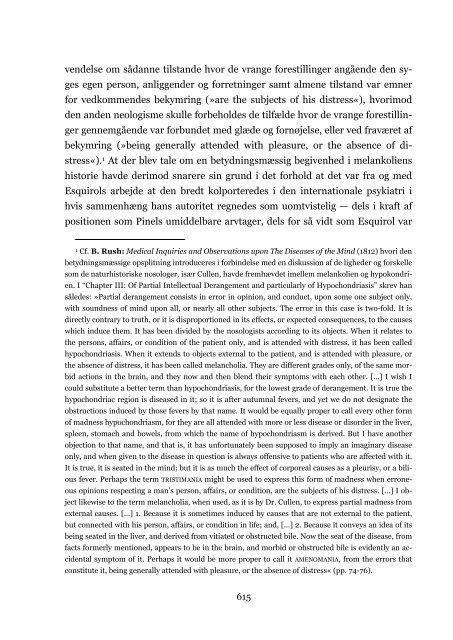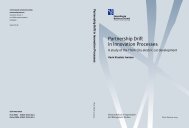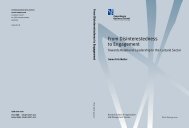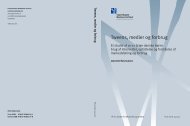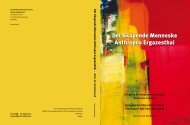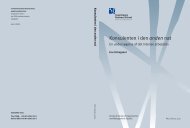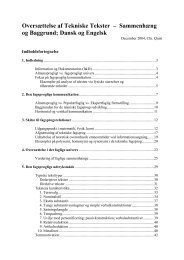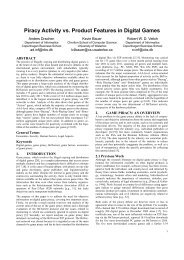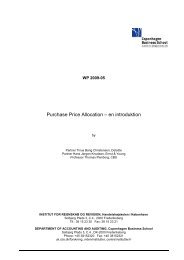- Page 1 and 2:
copenhagen business school handelsh
- Page 3 and 4:
Dansk resumé · English summary IN
- Page 5 and 6:
§19. Dåreanstalten i Slesvig og d
- Page 7 and 8:
hedsforanstaltning« for den offent
- Page 9 and 10:
1845, således konstatere at hvor d
- Page 11 and 12:
ansvarsløse handlinger igen skulle
- Page 13 and 14:
a. Den slesvigske dåreanstalt var
- Page 15 and 16:
sammen med eller kom til at eksiste
- Page 17 and 18:
oliger, og i rum der skulle indrett
- Page 19 and 20:
dels i helbredeligheden som en over
- Page 21 and 22:
disse var imidlertid båndlagte af
- Page 23 and 24:
de Sindssyge ved alle Yttringer af
- Page 25 and 26:
* c. Dette var på denne gennemregi
- Page 27 and 28:
enter stammede fra Slesvig (50%) og
- Page 29 and 30:
sering af afsindigheden der i dansk
- Page 31 and 32:
alene de relativt få læger der ha
- Page 33 and 34:
Slesvig havde fremkaldt billedet af
- Page 35 and 36:
landske dårevæsen kunne finde sin
- Page 37 and 38:
stalt, idet han i et efterfølgende
- Page 39 and 40:
dette tidpunkt således om 73 afsin
- Page 41 and 42:
endnu ikke var »sunkne saa dybt, a
- Page 43 and 44:
skelighedens Fordringer med Hensyn
- Page 45 and 46:
eller forryktheden), med samt de fo
- Page 47 and 48:
navn, køn, alder, ægteskabelige s
- Page 49 and 50:
Af resultaterne fremgik det imidler
- Page 51 and 52:
skyldtes derimod en række omstænd
- Page 53 and 54:
lem 150-200 helbredelige afsindige
- Page 55 and 56:
imod samtidig den afsindighed der e
- Page 57 and 58:
sesanstalt, sådan som det bekræft
- Page 59 and 60:
Pleiestiftelserne fjernes fra Helbr
- Page 61 and 62:
andet navn for uhelbredelighedens s
- Page 63 and 64:
kiatrisk praksis som måtte arbejde
- Page 65 and 66:
des i forlængelse af det epidemiol
- Page 67 and 68:
hvilede paa en virkelig praktisk Gr
- Page 69 and 70:
stok udført relativ Forbindelse me
- Page 71 and 72:
alene med udgivelsen af det agitato
- Page 73 and 74:
indelsessystemet og integrationen a
- Page 75 and 76:
for så vidt som tilhørsforholdet
- Page 77 and 78:
væsentlige bidrag til den nosokomi
- Page 79 and 80:
Dage)«. 1 At Selmer med selvfølge
- Page 81 and 82:
liv, og endelig en afsindighed der
- Page 83 and 84:
personligt. Nok var der i begge til
- Page 85 and 86:
Stilling til sine Omgivelser og dis
- Page 87 and 88:
mængde lige så utvivlsomt kun vil
- Page 89 and 90:
Hos Selmer derimod indgik antagelse
- Page 91 and 92:
c) Det var ikke mindst augmenterne
- Page 93 and 94:
tilfælde i form af de forårsagend
- Page 95 and 96:
imod umiddelbar og beroede snarere
- Page 97 and 98:
ved Jydske Asyl og den senere præs
- Page 99 and 100:
og melankolien alt eftersom de i fo
- Page 101 and 102:
Det er ikke påstanden at de beskre
- Page 103 and 104:
koordineredes i henhold til stemnin
- Page 105 and 106:
tragte som Syge, fordi de have tabt
- Page 107 and 108:
krydsfelt hvor hans fremstilling af
- Page 109 and 110:
forstaae altsaa herved Forstyrrelse
- Page 111 and 112:
Hvis det var denne mulige misforst
- Page 113 and 114:
nur als Zeichen und Symptom eines b
- Page 115 and 116:
skaben i mange Tilfælde at afgjør
- Page 117 and 118:
han med henvisning til de dobbelte
- Page 119 and 120:
se som Howitz implicit tematiserede
- Page 121 and 122:
over modsætningen til Howitz’ be
- Page 123 and 124:
der kom til udtryk i den langt sene
- Page 125 and 126:
henhold til sine specifikke handlef
- Page 127 and 128:
ske problematiserings arbejde, huma
- Page 129 and 130:
for også måtte holde sig tilbage
- Page 131 and 132:
trods det at han således kunne peg
- Page 133 and 134:
skildret ovenfor i forbindelse med
- Page 135 and 136:
§4. §6. B. §15. §16. §17. vat
- Page 137 and 138:
§28. §29. §22. Tilstand betimeli
- Page 139 and 140:
[2.2] Enhver, der vil besøge en Sy
- Page 141 and 142:
spilles der Kegler paa Hospitalets
- Page 143 and 144:
at gjøre Melding herom til Overops
- Page 145 and 146:
højet til lov 4. maj 1875: »Ingen
- Page 147 and 148:
domme specificeret som »kronisk Me
- Page 149 and 150:
tionerne. 1 Ud af de i alt 20 ident
- Page 151 and 152:
med enten »Sløvsind« eller »For
- Page 153 and 154:
mulige relation imellem klassifikat
- Page 155 and 156:
3000 2000 1000 FIGUR 6.4. Samlet an
- Page 157 and 158: a. Med dette afsæt fremstiller FIG
- Page 159 and 160: 350 300 250 200 150 100 50 0 1872 1
- Page 161 and 162: 90 80 70 60 50 40 30 20 10 0 1872 1
- Page 163 and 164: I asylets virkelighed kunne spørgs
- Page 165 and 166: værende Sygdom været voldsom elle
- Page 167 and 168: gjordes gældende overfor de afsind
- Page 169 and 170: Del af Helbredelserne falder paa de
- Page 171 and 172: tydelig Svækkelse i denne eller hi
- Page 173 and 174: mindsker Haabet om et heldigt Udfal
- Page 175 and 176: man fristes til at spørge, om Grun
- Page 177 and 178: fordelingen (med en forholdsforskyd
- Page 179 and 180: vorpen og grænseoverskridende elle
- Page 181 and 182: i referater angående udviklingsten
- Page 183 and 184: »I Begyndelsen af Mai blev Sindsst
- Page 185 and 186: »Sindsstemningen« som blev »næs
- Page 187 and 188: Endvidere havde »den karakteristis
- Page 189 and 190: illedet, beskrev Falret i forlænge
- Page 191 and 192: Det yderst vanskelige spørgsmål o
- Page 193 and 194: Pinel, Bicêtre, 1793- JESSEN, Sles
- Page 195 and 196: Så længe asyloverlægerne vedbliv
- Page 197 and 198: Esquirols arbejde og opgøre melank
- Page 199 and 200: elser sig også med hensyn til spø
- Page 201 and 202: tanitetsdefekter og afsindighedens
- Page 203 and 204: end den ville have været på henho
- Page 205 and 206: slog han imidlertid at dette navn a
- Page 207: eller »idiotie«, alle hjemmehøre
- Page 211 and 212: “Monomani”«. 1 Nok var denne l
- Page 213 and 214: kollegiets erklæring konkluderet a
- Page 215 and 216: den melancholia som overlæge Gøri
- Page 217 and 218: ende demonstrerede en »Orden i Tan
- Page 219 and 220: d) Den omtydning af melankolien der
- Page 221 and 222: selvom den redefinerede melankolis
- Page 223 and 224: Hvad der imidlertid kom til at inde
- Page 225 and 226: Alienationer i Begjæreevnen og i d
- Page 227 and 228: Der melder sig imidlertid en række
- Page 229 and 230: mindre anstalt i Odense, og heller
- Page 231 and 232: velkendt som Kants benævnelse for
- Page 233 and 234: (»passions«), sindsbevægelser (
- Page 235 and 236: imellem under navne som »Vanvid«,
- Page 237 and 238: indenfor rammerne af hovedgruppen a
- Page 239 and 240: te at måtte anholde frasen »“Et
- Page 241 and 242: måede at klassificere de psykiske
- Page 243 and 244: ne indeholde begge former for fremm
- Page 245 and 246: hans redegørelse for Jacobis klini
- Page 247 and 248: der var sket en større eller mindr
- Page 249 and 250: — Reflexionens og Anskuelsens sje
- Page 251 and 252: “Forstemthed” er hentet, bruger
- Page 253 and 254: dre regelbundet og vilkårligt end
- Page 255 and 256: vendige, men blot en specifikation
- Page 257 and 258: målet at imødegå hvad der ligned
- Page 259 and 260:
FIGUR 6.28. Klassifikation af alle
- Page 261 and 262:
De videre argumenter for den nye sy
- Page 263 and 264:
model i hvilken alle udtryk for sin
- Page 265 and 266:
sind, hvilket altid vil ske med en
- Page 267 and 268:
manien og melankolien som gemytssyg
- Page 269 and 270:
mært karakteriserede sig ved en he
- Page 271 and 272:
fikation og maniens og melankoliens
- Page 273 and 274:
lingsforslaget ville afstedkomme »
- Page 275 and 276:
liceret i Ugeskrift for Læger i fo
- Page 277 and 278:
Sløvsindet som Underafdelinger af
- Page 279 and 280:
ningernes statistik angående sygdo
- Page 281 and 282:
FIGUR 6.29. Forholdet mellem henhol
- Page 284:
KAPITEL 7 TREDJE DEL Stemningskateg
- Page 287 and 288:
dertil så mange af sine kræfter i
- Page 289 and 290:
noget fremmed« samt »de mange For
- Page 291 and 292:
interne forbedringer, allerede i sl
- Page 293 and 294:
Hos Dalhoff imidlertid var en såda
- Page 295 and 296:
det allersidste, kroniske og sekund
- Page 297 and 298:
Pågældende selvforholdsmæssighed
- Page 299 and 300:
psykiske livsytringer der på en be
- Page 301 and 302:
som også Selmer mere end 30 år ti
- Page 303 and 304:
stilling. I Danmark havde den tidli
- Page 305 and 306:
stande der i kontrast til de teoret
- Page 307 and 308:
vet af den grund ophørte med at v
- Page 309 and 310:
åder. Dette punkt havde at gøre m
- Page 311 and 312:
Kant, om end fra et filosofisk antr
- Page 313 and 314:
kategori. Når det i det følgende
- Page 315 and 316:
selvom den til tider kunne være de
- Page 317 and 318:
gældende imellem det afficerede og
- Page 319 and 320:
lelser«. På den anden side førte
- Page 321 and 322:
at beskæftige sig med spørgsmåle
- Page 323 and 324:
uden »Overlæg« havde begået den
- Page 325 and 326:
ger kunne stemningen, eller »Tilst
- Page 327 and 328:
e de »forskjellige særlige eensid
- Page 329 and 330:
komme til at herske«. 1 Af disse v
- Page 331 and 332:
§39. Den modificerede fakultetspsy
- Page 333 and 334:
psykologiske fakulteter, principiel
- Page 335 and 336:
monomanie intellectuelle, som en mo
- Page 337 and 338:
liv«, samt som »viljes-« og »dr
- Page 339 and 340:
1. TÆNKNING 2. FØLELSE 3. VILJE F
- Page 341 and 342:
nogle indledende implikationer der
- Page 343 and 344:
elementærforstyrrelsernes optræde
- Page 345 and 346:
Om denne sidstnævnte elementærfor
- Page 347 and 348:
Med det han havde refereret til som
- Page 349 and 350:
etning af stemningssindssygdom blev
- Page 352 and 353:
KAPITEL 8 Melankolien som erfarings
- Page 354 and 355:
da hun kort efter stod op; hun gjor
- Page 356 and 357:
derligt, og den vedbliver at bestaa
- Page 358 and 359:
for en nedtrykkende eller deprimere
- Page 360 and 361:
ker tilsidst driver instinktmæssig
- Page 362 and 363:
* c) Omtrent 40 år efter at erklæ
- Page 364 and 365:
somhed havde oparbejdet en evne til
- Page 366 and 367:
med det normale og det patologiske.
- Page 368 and 369:
der korresponderede og kongruerede
- Page 370 and 371:
uden at berette præcis hvad den va
- Page 372 and 373:
jeslivet der omvendt den disponered
- Page 374 and 375:
er han da i sin sygelige Nedtrykthe
- Page 376 and 377:
sin yderliggående grad og intensit
- Page 378 and 379:
gensteds. Hun har, som hun siger, e
- Page 380 and 381:
fremhævede Pontoppidan i en forel
- Page 382 and 383:
a) Det var som skildret især i sam
- Page 384 and 385:
Flindt i sin almene psykopatologi h
- Page 386 and 387:
Hvor Dalhoff ikke behandlede dette
- Page 388 and 389:
Netop denne dispositionsmodel, med
- Page 390 and 391:
har præget stemningslidelsernes pr
- Page 392 and 393:
Rækken af førstnævnte symptomer
- Page 394:
en enkelt Gang Noget, var det, at h
- Page 397 and 398:
gaar gjennem alle Samfundets Lag, o
- Page 399 and 400:
Det var således på den omtalte f
- Page 401 and 402:
ger i dømmekraften, dels i sin for
- Page 403 and 404:
fælde måtte gå (»Er man da syg,
- Page 405 and 406:
det legemlige og i det sjælelige,
- Page 407 and 408:
menhængende: “Guten Morgen, mon
- Page 409 and 410:
Hvor monotonien i den melankoliske
- Page 411 and 412:
frem usømmelig i sin Færd«, noge
- Page 413 and 414:
get subnormal«; og endelig bemærk
- Page 415 and 416:
udprægede maniakalske tilstand, »
- Page 417 and 418:
tilegnelseslyst (kleptomani)«. »O
- Page 419 and 420:
826 FIGUR 9.2. Den manio-melankolsk
- Page 421 and 422:
At der imidlertid alligevel netop s
- Page 423 and 424:
skærpet Sands af det paa sygelig M
- Page 425 and 426:
ufornuft. Denne spejling og det fæ
- Page 427 and 428:
ser sit eget ligtog, ser sig omgive
- Page 429 and 430:
deværelse af de moderne vanvidstil
- Page 431 and 432:
haabløst forspildt; hans Fjender l
- Page 433 and 434:
manien i melankolien som den bygged
- Page 435 and 436:
1880}, {Beretn. Oringe, 1881}, {Ber
- Page 437 and 438:
“Placat af 19. Nov. 1828 for Danm
- Page 439 and 440:
Andrews, Johnathan: “From stack-f
- Page 441 and 442:
BERGSØE, Adolph Frederik: Den dans
- Page 443 and 444:
Bos, Jacques: “The rise and decli
- Page 445 and 446:
ar (eds.): Fact and Value in Emotio
- Page 447 and 448:
DALHOFF, Viggo & JØRGENSEN, Alfred
- Page 449 and 450:
Emminghaus, Hermann: Allgemeine Psy
- Page 451 and 452:
— “Le jeu de Michel Foucault”
- Page 453 and 454:
— Om Sindssygdom. København, Det
- Page 455 and 456:
— “Oversigt over de i Sygeafdel
- Page 457 and 458:
Hilgard, E. R.: “The trilogy of m
- Page 459 and 460:
— Om Daarevæsnets Indretning i D
- Page 461 and 462:
Jones, Kathleen: A History of the M
- Page 463 and 464:
— Lehrbuch der Psychiatrie auf kl
- Page 465 and 466:
— Genera Plantarum Eorumque Chara
- Page 467 and 468:
Misbach, Judith & Stam, Henderikus
- Page 469 and 470:
MØLLERHØJ, Jette: På Gyngende Gr
- Page 471 and 472:
Parker, Gordon & Dusan Hadzi-Pavlov
- Page 473 and 474:
PONTATUS, Iohannes Issac (Hans Isaa
- Page 475 and 476:
ROHMELL, O.: “Beretning om Sct. H
- Page 477 and 478:
Seidelin, Johannes Henrik: “Redeg
- Page 479 and 480:
se. Ledelse og styring i den selvst
- Page 481 and 482:
for the insane: to which are added
- Page 483 and 484:
— “Philippe Pinel, pere: Deux g
- Page 485:
— Af mit Livs og min Tids Histori
- Page 488:
og Forbindelsessystemet. Tiden: hel
- Page 491 and 492:
19. Thomas Lyse Hansen Six Essays o
- Page 493 and 494:
30. Ole Hinz Den effektive forandri
- Page 495 and 496:
11. Christian Moldt-Jørgensen Fra
- Page 497 and 498:
12. Claus Bajlum Essays on Credit R
- Page 499 and 500:
24. Christian Scheuer Employers mee
- Page 501 and 502:
36. Annegrete Juul Nielsen Travelin
- Page 503 and 504:
9. Thomas Frandsen Managing Modular
- Page 505 and 506:
8. Robert W. D. Veitch Access Decis


